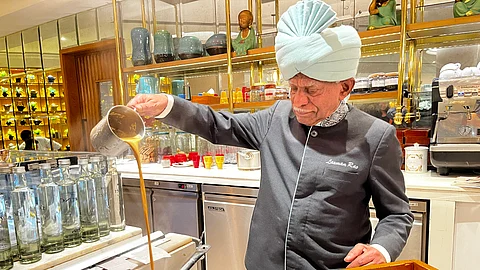

Every morning, at 6.30 am, Laxman Rao, 71-year-old tea-seller and writer, arrives at Shangri-La Eros’ tea lounge Mister Chai. He prepares morning tea for about 300-400 guests at the hotel with the help of the other staff. His masala chai is nothing short of an alchemy of flavours where fresh full cream milk is brewed with aromatic tea leaves and infused with cardamom and ginger to craft a magic potion of sorts.
His hands work steadily even as he narrates stories from his life to the guests, serving both tea and tales. “I never imagined that I would work for a five-star hotel at the age of 70 when most people retire! I don’t feel lethargic at all. In fact, I have never been absent from work in the past three years,” says the tea-seller from Delhi, perhaps the only one from his tribe in the city famous for having penned 25 novels, plays, and essays, and who has been working for three years as a tea consultant with Shangri-La Eros.
Rao’s tea is so loved that the visitors at the hotel request for a piping hot cup even at 4 am, if they have an early morning flight to catch. “It feels great to see such demand. For me, tea is not just a beverage but a way to think, interact with others and carry out soulful conversations for hours,” he says, as we see the staff, whom he supervises, call him ‘chacha’ instead of sir.
While making tea has become Rao’s ‘identity’, he is a writer “by passion”. From writing about political figures in The Barrister Gandhi (2020), Pradhanmantri (2015), and The Philosopher Jawaharlal Nehru (2024), to books such as Narmada (2018), Renuu (2018) and Dansh (2017) inspired by ordinary people from everyday life, his works on moral dilemmas, governance and societal issues have won him recognition from the late Prime Minister Indira Gandhi and former President Pratibha Patil.

Memories at ITO
Born to a farming family in Maharashtra’s Talegaon Dashasar village, Rao came to Delhi in 1975 with a dream to become a Hindi writer. However, surviving in a big and expensive city such as Delhi was challenging, which led him to do odd jobs such as selling paan and hand-rolled cigarettes, and finally selling tea at ITO. “I became a chaiwallah out of the need to support my family. It is not a personal achievement to brag about which politicians do these days to influence the common man. They don’t understand that nobody wants to be a chaiwallah out of passion; it’s only a compulsion,” he says disarmingly on the new-age rebranding of ‘chaiwallah’ as a messiah to connect with the masses.
“Nevertheless, I have kept up with being a tea-seller as it has helped me gain recognition as a writer,” he says while making his special masala tea for us. Rao’s tea-selling business grew in the ’90s, 2000s, and 2010s and the strategic location of ITO got him noticed even more. He recalls: “There was a friend of mine working as a labourer who brought me to ITO to put up my stall. It was my luck that that area was full of writers, journalists and intellectuals who took note of my work and read my stories.
That area became my intellectual centre for over 35 years. People used to stop by my stall not just for tea but for its hygiene and my books.” It helped him save enough money to self-publish his writings under his publishing house, Bhartiya Sahitya Kala Prakashan, when all other publishing houses refused to publish his work calling him “unqualified”, leading him to pursue graduation and a masters in Hindi Literature.

Cross-questioning ideas
The year 1979 proved to be life-altering for him as he self-published his first novel Nayi Duniya Ki Nayi Kahani. He went on to publish his bestsellers, Ramdas (1992), Renuu (2008), Narmada (2014), and many more. All his 25 novels are stacked on a rack at Mister Chai. Was it difficult to write, given he had a demanding day job? “When life is a teacher, ideas come naturally. Most of my books are inspired by real-life figures who influenced me.
For instance, Renuu is based on a CA-aspirant who was attending coaching classes in Delhi. I got to know about her from the boys who used to study with her and talked about her at my ITO tea stall in the ’90s. Ramdas is about a boy from my village in Amravati who drowned. I wrote a book on the tenure of the then Prime Minister Indira Gandhi after I was invited to meet her at Teen Murti Bhawan,” says Rao, who is a recipient of the Indraprastha Sahitya Bharti award.
Beyond his work as a tea consultant, Rao often goes to schools and colleges in Delhi as a guest faculty. “I encourage students to do an in-depth reading of books and novels beyond their course, analyse the text and, if need be, question its ideas. A deep study of things enhances cognitive and creative abilities unlike the multiple-choice questions and one word question-answer format that is being followed these days in educational institutes,” he says.
Rao is currently working on two new novels. “Ye adhyayan hai aur zindagi bhar chalega. (Writing is a meditative study and a life-long practice),” he says, and he will go on with it.